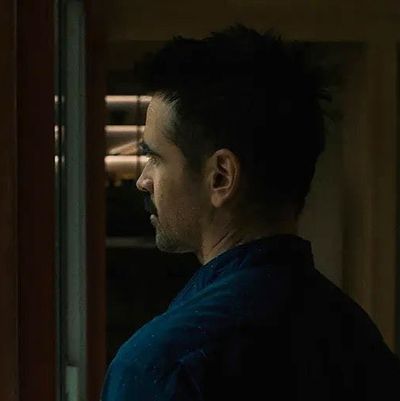
Vulture is recirculating this piece ahead of After Yang’s release in theaters on Friday, March 4. Put on a straight face and get your dancing shoes on.
This year’s Cannes has everything: Matt Damon in redneck drag trying to get his daughter out of French prison; a puppet-baby superstar; Adam Driver performing cunnilingus twice while singing; hordes of journalists spitting into tubes; and now, its own version of the Ex Machina robot dance sequence, this time featuring the fluid moves of Colin Farrell. The moment in question occurs right at the beginning of After Yang, which premiered last night at the Debussy, where director Kogonada and stars Jodie Turner-Smith, Haley Lu Richardson, and 9-year-old Malea Emma Tjandrawidjaja took to the stage to profess their love for one another and the film — “I have a mix of feelings right now, but everything is so happy because I am with the people I love the most,” said Tjandrawidjaja, as all four appeared to tear up — and explain that co-stars Farrell and Justin H. Min were too busy filming elsewhere to stop by.
Kogonada’s second feature after his critically acclaimed 2017 debut Columbus, After Yang is a gentle, meditative sci-fi about a “technosapien” named Yang (Min) who’s meant to help his “sister” Mika (Tjandrawidjaja) feel connected to her Chinese heritage, but who ends up becoming much more to her, teaching her how to play instruments and important life lessons, making her pancakes, and bonding deeply with her. When Yang suddenly and inexplicably malfunctions, Mika’s detached parents (Smith and Farrell) — who spend most of their time working and absolutely obsessing over fancy teas, respectively, while Yang essentially raises Mika — must figure out what’s wrong with him, as well as how to reconnect with their daughter and each other.
Most of the film is an understated, simmering, Black Mirror–on–Xanax dive into the depths of Yang’s “body” and “memories” in an attempt to salvage him, a quiet but often very affecting existential contemplation on death, memory, familial connection, and, yes, fancy teas. Farrell spends the duration of After Yang traveling back and forth from various robot repair shops and robot museums and his own little tea shop in a sort of futuristic whooshing portal, watching Yang’s stored-data bank play out on a pair of VR glasses, having tense interactions with his frustrated wife (over tea), and occasionally comforting his daughter, who’s slowly losing it over the loss of her most beloved companion. In other words, this is a sad-ass movie that wants you to cry softly into your KN95.
But the first 10 or so minutes of After Yang feel yanked from a separate movie entirely. After a few moments establishing that Colin Farrell cannot stop thinking about fancy teas, he and his family (Yang included) gather in the living room in matching shiny black jumpsuits and stand in a loose V formation. “Welcome, families of four, to our monthly dance-off,” says a voice off-screen. A fast-paced techno song begins, and the family instantly kicks into gear, performing perfectly executed, synchronized TikTok-level choreography, entirely straight-faced and with an intensity that I had begun to think could only be reserved for making tea. The shot begins to rotate between Farrell and Smith’s family and three other families in similarly shiny, coordinated outfits; it soon becomes clear that they’re all participating in a virtual global dance-off, the stakes of which are unknown (perhaps it’s for just a sort of international dignity) but appear extremely high to everyone involved, all of whom possess the sort of singular mental and physical focus that I thought had been eliminated with the invention of the iPhone. Each additional family in the competition features characters (Richardson, Sarita Choudhury) who don’t know each other yet, but who will encounter each other over the course of the film.
Much like Ex Machina, the After Yang dance sequence gets off on making a very serious actor do a very ridiculous thing with a robot while still maintaining his serious-actor face. One has not truly lived until one has seen Colin Farrell, solemn, in a full-body jumpsuit, doing a competitive TikTok. Farrell, Min, Turner-Smith, and Tjandrawidjaja hurtle through level after level, slicing their arms through the air, executing flawless Mortal Kombat kicks,. (The Zoomishness of it all, combined with the forced-enthusiastic structured indoor activity, hit a little too close to home for those of us who spent the last year doing just as absurd things in front of our computers.)
At the behest of the disembodied voice of the host, the foursome do a move called the “Earthquake,” a move called “Tornado Time,” and pause in their machinations for a worldwide “Family Portrait.” Finally, they reach the Stamina Round, along with only 2,000 other families worldwide. Tragically, here, the family is “terminated” for being briefly out of sync with one another, and they begin to good-naturedly argue over who screwed them up — Farrell accuses Turner-Smith; Tjandrawidjaja accuses Farrell. Ultimately, it seems it may have been Yang, whose mysterious malfunction sees him continuing to do the dance moves in the family living room even after the music has stopped.
The rest of the movie doesn’t come close to capturing this sequence’s mixture of wit and goofy charm, but Kogonada doesn’t exactly seem interested in doing that anyway. Though he lures us in with the promise of Colin Farrell perverting the very foundation of Dance Dance Revolution, he ultimately wants us to think about the abyss, about pain and the loss of innocence, about the devastating destruction of the natural world, about what makes a family and what we owe to the people we love. And, of course, tea.
More From France
- Jeremy Strong Practiced His Dad Jokes on Anne Hathaway
- Nitram Dares You Not to Look Away
- The Worst Person in the World’s Glowing Reviews Made Renate Reinsve Puke


